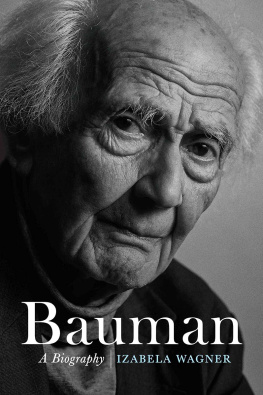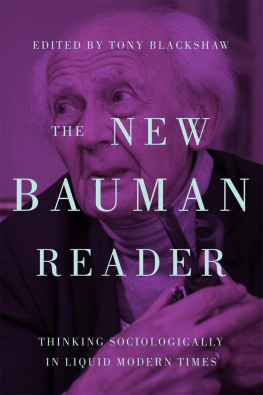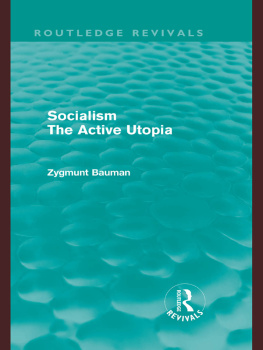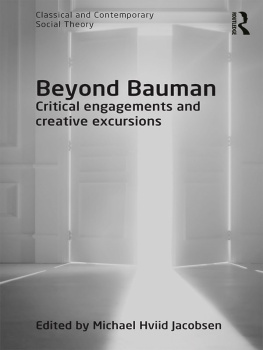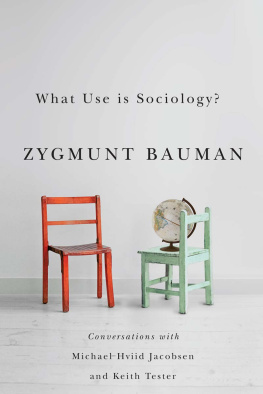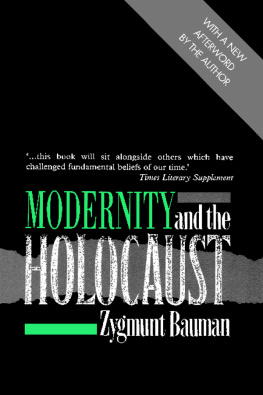First published 2008 by Ashgate Publishing
Published 2016 by Routledge
2 Park Square, Milton Park, Abingdon, Oxon OX14 4RN
711 Third Avenue, New York, NY 10017, USA
Routledge is an imprint of the Taylor & Francis Group, an informa business
Copyright Mark Davis 2008
Mark Davis has asserted his right under the Copyright, Designs and Patents Act, 1988, to be identified as the author of this work.
All rights reserved. No part of this book may be reprinted or reproduced or utilised in any form or by any electronic, mechanical, or other means, now known or hereafter invented, including photocopying and recording, or in any information storage or retrieval system, without permission in writing from the publishers.
Notice:
Product or corporate names may be trademarks or registered trademarks, and are used only for identification and explanation without intent to infringe.
British Library Cataloguing in Publication Data
Davis, Mark, 1978-
Freedom and consumerism : a critique of Zygmunt Baumans sociology
1. Bauman, Zygmunt, 1925- 2. Sociology
I. Title
301.092
Library of Congress Cataloging-in-Publication Data
Davis, Mark, 1978-
Freedom and consumerism : a critique of Zygmunt Baumans sociology / by Mark Davis.
p. cm.
Includes bibliographical references and index.
ISBN 978-0-7546-7271-5
1. Bauman, Zygmunt, 1925- 2. Sociology. I. Bauman, Zygmunt, 1925- II. Title.
HM479.B39D38 2008
301.092--dc22
2008002420
ISBN 13: 978-0-7546-7271-5 (hbk)
The author would like to acknowledge the following publishers for the rights to use the following extracts:
Introduction, quote from Thinking Sociologically by Zygmunt Bauman, published by Basil Blackwell. Reprinted with permission of Basil Blackwell, Oxford. , excerpt from p. 26 from The Prince by Niccolo Machiavelli, edited by P. Bondanella (2005), and excerpt from p. 24 from Candide and Other Stories by Voltaire, edited by R. Pearson (2006), are both published by Oxford Worlds Classics and reprinted with permission of Oxford University Press.
There are a number of people that I would like to thank: Paul Bagguley, Austin Harrington, Richard Kilminster, William Outhwaite, Keith Tester and Ian Varcoe have all been kind enough to offer ongoing support and to comment upon drafts of work at various stages of completion. In particular, Richard Kilminsters remarks on the final draft have significantly improved the book as a whole. I would also like to offer my thanks to the anonymous reviewers at Ashgate for their comments and suggestions. Any errors that may still remain are entirely my own. Also at Ashgate, I am especially grateful to Caroline Wintersgill, who first saw potential in the book and was kind enough to take the project on, and to my commissioning editor Neil Jordan for his continued help with the manuscript and publication process.
On a personal note, I consider myself fortunate enough to have so many colleagues and friends deserving of my thanks that they cannot all appear here by name. They know who they are. However, I would like to acknowledge Keith Hodgson, whose wit and energy in the classroom first sparked my sociological imagination. My gratitude is also offered to Les Gofton, who first introduced me to Baumans writings when I was an undergraduate student at Newcastle University. And finally, a very special mention must go to my parents, Garry and Joan, for their love, support and unrelenting faith in their eldest sons work.
Without them all, this book would not have been possible.
Being free and unfree at the same time is perhaps the most common of our experiences. It is also, arguably, the most confusing. No doubt it is one of the most profound puzzles of the human condition which sociology attempts to unravel. Indeed, much of the history of sociology may be explained as an on-going effort to solve this puzzle. (Bauman 1990, 20)
This book is not an enquiry into the metaphysics of freedom. That is, I am not trying here to answer the philosophical question: what is freedom?. Although philosophical studies certainly inform the present work at various points, it does not address the metaphysical questions surrounding the nature of freedom itself. Nor is the book an enquiry into the political theory of freedom. As such, where the political traditions of conservatism, liberalism, and socialism are considered at various stages of the present research, they are invoked as styles of thought (Mannheim 1946; 1986) to illuminate particular aspects of a given argument or line of enquiry. My treatment of these traditions is, therefore, not exhaustive and makes no claim to completion. Enough of what the book is not.
The present work is a critical enquiry into the sociology of Zygmunt Bauman, specifically his English-language writings from the 1960s onwards. His Polish writings have not been included necessarily, on linguistic grounds although their tenor has been inferred from time to time from secondary sources (Morawski 1998; Satterwhite 1992; Tester and Jacobsen 2006).
The book has two main aims. Firstly, the intention is to make a contribution to existing sociological debates about modern society by offering an interpretation of Baumans sociology based upon the concept of freedom. Put simply, I identify freedom as a thematic continuity in Baumans English-language writings, typically in terms of his extensive consideration of consumerism, with a view to illuminating both. So far, existing studies have focused upon other salient themes in his work, most notably culture, power and socialism. However, there is nowhere a systematic investigation into his work that takes the concept of freedom as an axiomatic principle informing all his sociological thinking.
The second aim of the present work is to open up new areas of discourse surrounding Baumans work, by clarifying his understanding of freedom in relation to the great political traditions of conservatism, liberalism, and socialism. As indicated above, existing scholarship in this area has rightly considered socialism to be an important theme in Baumans work. However, this has so far not been considered explicitly with relation to freedom in any significant depth, or in relation to conservatism or liberalism. In addressing both of these main aims, I intend to offer a new line of interpretation of Baumans sociology, which is fast becoming an increasingly fashionable area of sociology.
The description of Baumans sociology as fashionable is deliberate. Since the research for this book began, there has been a profusion of publications interpreting Baumans work. Moreover, this rate of publications is perhaps only matched by Bauman himself, who has published no fewer than ten books during this time. That the present research has sought to engage with all of this work is hopefully something that will benefit the study as a whole.



